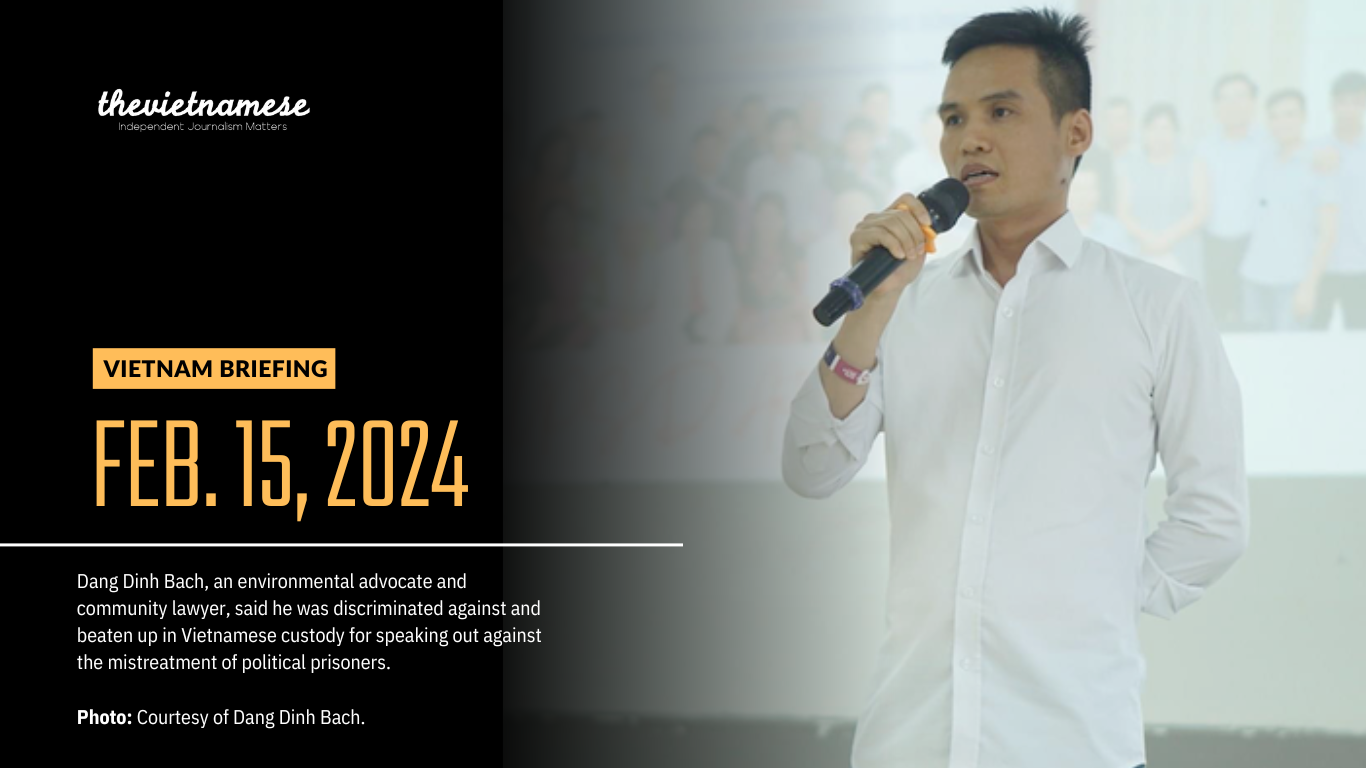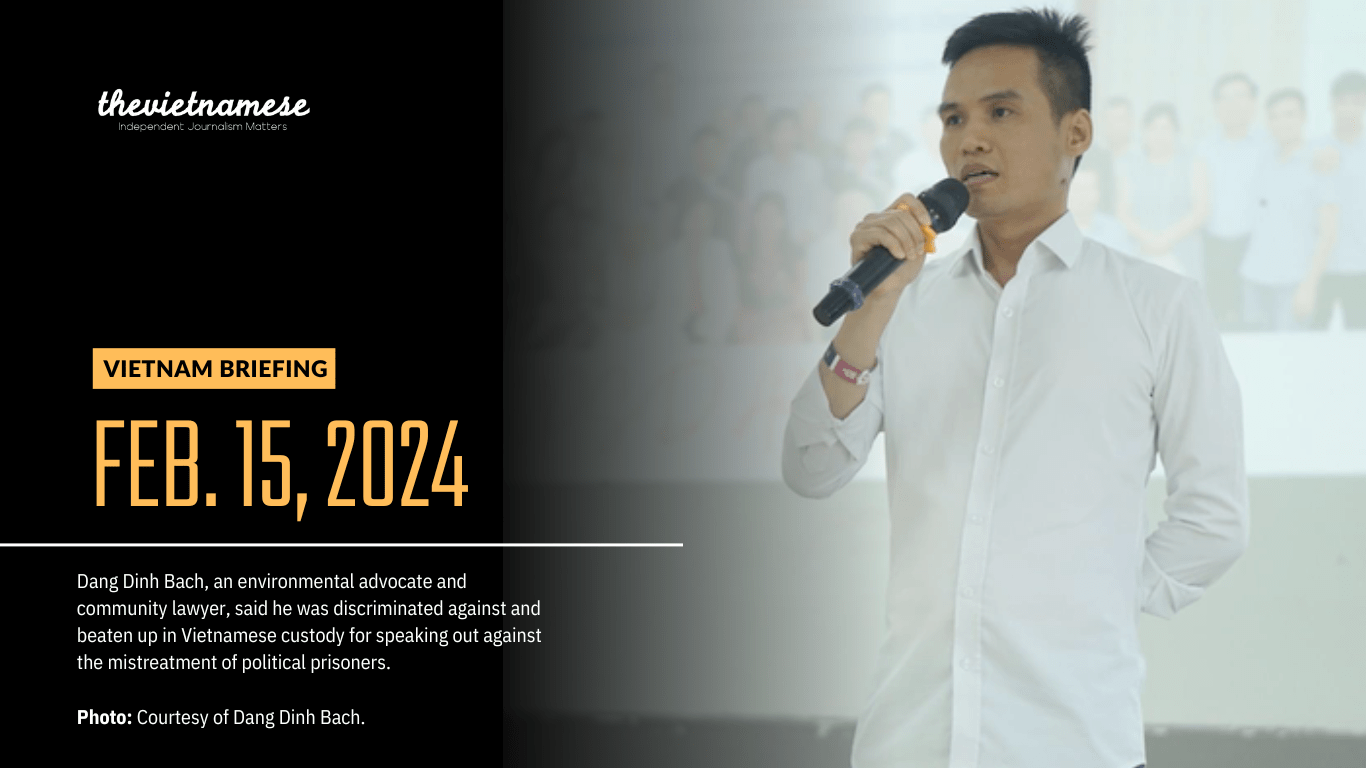UN Experts Concerned about the Safety of Environmental Activist Dang Dinh Bach

In a press release published on Feb. 14, a group of United Nations experts expressed concerns about the well-being of imprisoned Vietnamese environmental advocate and lawyer Dang Dinh Bach, who is on a hunger strike in protest against poor detention conditions. The statement mentioned reports that Bach had been attacked and beaten while in custody. They also urged Hanoi to stop targeting and mistreating human rights defenders.
The statement, co-signed by 10 UN experts, was posted on the website of the Office of the UN High Commissioner for Human Rights (OHCHR), a day after Vietnam had its Universal Periodic Review (UPR) pre-session on Feb. 13, organized to discuss the country’s human rights situation. The Working Group on Arbitrary Detention has concluded in its Opinion 22/2023 that Bach’s deprivation of liberty is arbitrary as he was held incommunicado during the investigation period and had limited access to his lawyer.
Concerned with Dang Dinh Bach’s repeated hunger strikes, which were reported by Radio Free Asia (RFA), the UN experts affirmed that Bach “should not have to embark on a hunger strike to demand strict enforcement of laws and dignified prison conditions.” They added that the deprivation of liberty and mistreatment in prison “should not be used as a tool by the Vietnamese government to silence human rights defenders and civil society members working on sensitive issues.”
The statement pressured Vietnamese authorities to cease its conviction and mistreatment of Dang Dinh Bach in prison, as well as improve his prison conditions and access to necessities – such as food and medicine – under international human rights standards.
Prison in Vietnam Refuses to Sell Canteen Food to Political Prisoner Tran Huynh Duy Thuc
Correctional authorities in Nghe An Prison No. 6 have reportedly refused to sell canteen food to Tran Huynh Duy Thuc, a Vietnamese prisoner of conscience who is serving a 16-year sentence after he initiated a hunger strike to protest the prison’s poor living conditions, Thuc’s family told Radio Free Asia (RFA) on Feb. 14.
Although Thuc voluntarily ended his strike on Feb. 2, he told his family that the prison authorities had denied him canteen food a week later. Prisoners in Vietnam can buy higher quality food from prison canteens in addition to their basic prison meals; they are also allowed to receive non-perishable food from their families. But political prisoners often face deprivation of canteen food, hot water, and essential healthcare as an extra form of punishment.
The prison authorities claimed they refused to sell Thuc food because he exceeded the monthly purchase limit of 1.7 million dong. Thuc, who is now in the final year of his sentence, has staged numerous hunger strikes to protest against prison conditions at Prison No. 6. He is in poor health following his most recent hunger strike on Jan. 27.
Tran Huynh Duy Tan, Thuc’s younger brother, said the family was happy when Thuc ended his hunger strike. Still, they are worried that he will resume the protest given the Nghe An Prison’s continuous mistreatment of political prisoners. They added that the prison authorities also restricted access to hot water from Thuc and his cellmate, Dang Dinh Bach, a former civil society leader. Officials in Nghe An Prison No. 6 have not responded to requests for comment on the situation of both political prisoners.
Human Rights Watch Condemns Vietnam’s Conviction of Khmer Krom Facebook User
New York-based advocacy group Human Rights Watch (HRW) on Feb. 11 released a statement condemning Vietnam’s recent sentencing of Danh Minh Quang, a Khmer Krom social media user in Soc Trang Province. Quang has been charged with “abusing democratic freedoms,” an alleged violation of the country’s Penal Code. Previously, on Feb. 7, a court in Soc Trang convicted and sentenced Quang to three and a half years of imprisonment.
“The government of Soc Trang province shamelessly trampled on the right of freedom of expression and retaliated against a citizen for simply stating his politically independent views on social media,” said Phil Roberson, Asia deputy director at HRW. “The authorities should immediately release Danh Minh Quang and drop all charges against him.”
Robertson added that Vietnam’s National Assembly, its legislative branch, should “urgently amend the penal code and repeal rights-abuse articles, including Article 331, which is systematically being used to violate the rights of ordinary people across the country.”
According to the authorities, Quang, 37, had posted many video clips on Facebook that “propagandized and distorted the State’s national issues, democracy and human rights.”
The Soc Trang authorities stated that Quang’s online activities had “negatively affected the people’s thoughts and solidarity, and negatively affected the State’s views and policies on democracy and human rights.”
In March 2023, Danh Minh Quang and a fellow Khmer Krom were interrogated by the Soc Trang police for attending an event celebrating International Women’s Day and wearing a T-shirt bearing the Khmers Kampuchea-Krom Federation symbol, an organization accused of being “seditious” by the police.
EU Parliament Discusses Human Rights Monitoring Mechanism, Highlights Violations by the Vietnamese Government
The Human Rights Subcommittee of the European Union (EU) Parliament on Feb. 14 held a conference on the mechanism for monitoring the implementation of the human rights commitment as required in free trade agreements with other countries, Voice of America (VOA News) reported.
During the conference, members of the EU Human Rights Subcommittee discussed EU policies concerning the implementation of human rights protection and rights violations in Vietnam, Ethiopia, and Tunisia. In a statement released after the meeting, the subcommittee announced that it had discovered a gap between the EU’s legal regulations and the actual implementation of human rights practices with its trade partners, including Vietnam.
The statement said that the human rights situation in Vietnam, Ethiopia, and Tunisia had “deteriorated in recent years.” Gaelle Dusepulchre, vice president of the International Federation for Human Rights, said that the current mechanism is ineffective in monitoring the implementation of the Free Trade Agreement between the EU and Vietnam (EVFTA).
Dusepulchre added that she does not believe existing mechanisms are efficient enough to make countries like Vietnam properly uphold their human rights commitments. EVFTA requires both the EU and Vietnam to protect the rights of human rights workers and the involvement of civil society in monitoring the government’s commitment to ensuring these commitments are respected.
Vietnam Insight: Learn more about Vietnam
Vietnam headed to the future with a defective compass
East Asia Forum/ Alexander L Vuving/ Feb. 12
“As the anti-graft campaign enters its 13th year, corruption shows no sign of declining. Instead of boosting the public’s trust in the regime as the campaign intends, it benefits mostly the regime’s law enforcement branch while paralysing the government bureaucracy as officials tend to play it safe and refuse to make decisions when they do not benefit personally.
Repressing the fledgling civil society is another major line of Hanoi’s effort to uphold Communist Party rule. Citizens were arrested and received heavy sentences for ‘taking advantage of the rights of freedom and democracy’ and ‘spreading anti-government propaganda’. When these charges were found to be too far from the facts — as was the case with activists and experts working on environmental and energy issues — authorities instead accused them of tax evasion.”

